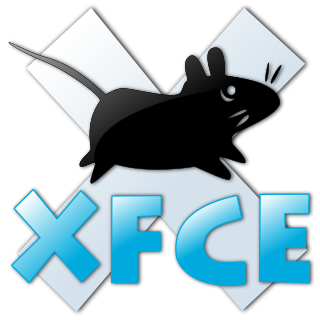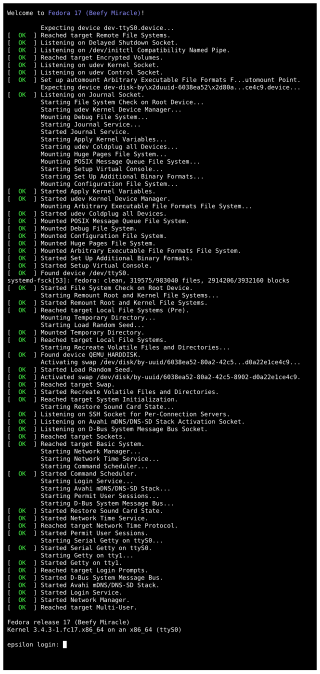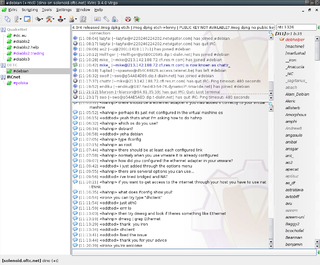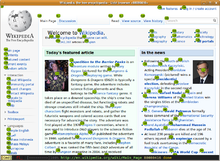
Irssi is an IRC client program for Linux, FreeBSD, macOS and Microsoft Windows. It was originally written by Timo Sirainen, and released under the terms of the GNU GPL-2.0-or-later in January 1999.

Ghostscript is a suite of software based on an interpreter for Adobe Systems' PostScript and Portable Document Format (PDF) page description languages. Its main purposes are the rasterization or rendering of such page description language files, for the display or printing of document pages, and the conversion between PostScript and PDF files.

Xfce or XFCE is a free and open-source desktop environment for Linux and other Unix-like operating systems.

GNOME Web, called Epiphany until 2012 and still known by that code name, is a free and open-source web browser based on the GTK port of Apple's WebKit rendering engine, called WebKitGTK. It is developed by the GNOME project for Unix-like systems. It is the default and official web browser of GNOME, and part of the GNOME Core Applications.

The GNU C Library, commonly known as glibc, is the GNU Project's implementation of the C standard library. Despite its name, it now also directly supports C++. It was started in the 1980s by the Free Software Foundation (FSF) for the GNU operating system.
In computing, minimalism refers to the application of minimalist philosophies and principles in the design and use of hardware and software. Minimalism, in this sense, means designing systems that use the least hardware and software resources possible.

dwm is a minimalist dynamic window manager for the X Window System developed by Suckless that has influenced the development of several other X window managers, including xmonad and awesome. It is externally similar to wmii, but internally much simpler. dwm is written purely in C for performance and security in addition to simplicity, and lacks any configuration interface besides editing the source code. One of the project's guidelines is that the source code is intended to never exceed 2000 SLOC, and options meant to be user-configurable are all contained in a single header file.
This is a comparison of notable free and open-source configuration management software, suitable for tasks like server configuration, orchestration and infrastructure as code typically performed by a system administrator.

Graphics Layout Engine (GLE) is a graphics scripting language designed for creating publication quality graphs, plots, diagrams, figures and slides. GLE supports various graph types such as function plots, histograms, bar graphs, scatter plots, contour lines, color maps and surface plots through a simple but flexible set of graphing commands. More complex output can be created by relying on GLE's scripting language, which is full featured with subroutines, variables, and logic control. GLE relies on LaTeX for text output and supports mathematical formula in graphs and figures. GLE's output formats include EPS, PS, PDF, JPEG, and PNG.

Midori is a free and open-source web browser. In 2019, the Midori project merged with the Astian Foundation, then Midori was revamped entirely, switching from WebKitGTK to using Electron.

The TurnKey Linux Virtual Appliance Library is a free open-source software project which develops a range of Debian-based pre-packaged server software appliances. Turnkey appliances can be deployed as a virtual machine, in cloud computing services such as Amazon Web Services or installed in physical computers.

The Intelligent Input Bus is an input method (IM) framework for multilingual input in Unix-like operating-systems. The name "Bus" comes from its bus-like architecture.

Arora is a discontinued free and open-source web browser developed by Benjamin C. Meyer. It was available for Linux, Mac OS X, Windows, FreeBSD, OS/2, Haiku, Genode, and any other operating system supported by the Qt toolkit. The browser's features included tabbed browsing, bookmarks, browsing history, smart location bar, OpenSearch, session management, privacy mode, a download manager, WebInspector, and AdBlock.

systemd is a software suite that provides an array of system components for Linux operating systems. The main aim is to unify service configuration and behavior across Linux distributions. Its primary component is a "system and service manager" – an init system used to bootstrap user space and manage user processes. It also provides replacements for various daemons and utilities, including device management, login management, network connection management, and event logging. The name systemd adheres to the Unix convention of naming daemons by appending the letter d. It also plays on the term "System D", which refers to a person's ability to adapt quickly and improvise to solve problems.

KVIrc is a graphical IRC client for Linux, Unix, Mac OS and Windows. The name is an acronym of K Visual IRC in which the K stands for a dependency to KDE, which became optional from version 2.0.0. The software is based on the Qt framework and its code is released under a modified GNU General Public License.

xombrero is a discontinued open-source web browser developed with a goal to be a lightweight and secure replacement for full featured browsers like Firefox. The browser has found a niche among minimalist browsers for heavy keyboard users by balancing minimalism with usability.
A lightweight web browser is a web browser that sacrifices some of the features of a mainstream web browser in order to reduce the consumption of system resources, and especially to minimize the memory footprint.

mpv is free and open-source media player software based on MPlayer, mplayer2 and FFmpeg. It runs on several operating systems, including Unix-like operating systems and Microsoft Windows, along with having an Android port called mpv-android. It is cross-platform, running on ARM, PowerPC, x86/IA-32, x86-64, and MIPS architecture.
A headless browser is a web browser without a graphical user interface.

qutebrowser is a Chromium-based web browser for Linux, Windows, and macOS operating systems with Vim-style key bindings and a minimal GUI. It is keyboard-driven and is inspired by similar software such as Vimperator and dwb. It uses DuckDuckGo as the default search engine. qutebrowser is included in the native repositories of Linux distributions such as Fedora and Arch Linux. qutebrowser is developed by Florian Bruhin, for which he received a CH Open Source award in 2016.



















